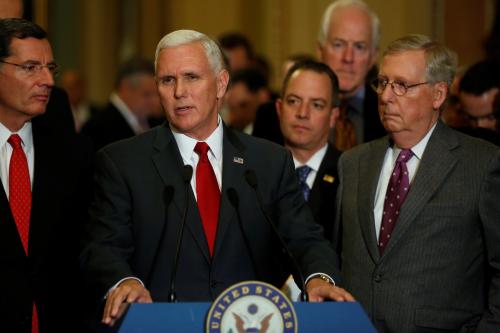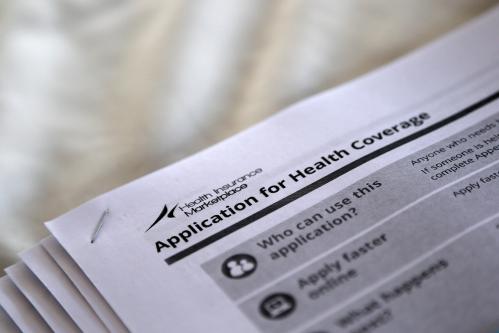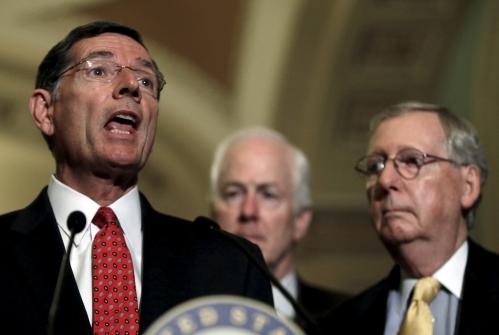House Republicans released their long-awaited plan for repealing and replacing portions of the Affordable Care Act this week, and there are plenty of “key players” to watch as the bill’s fortunes develop. House and Senate leadership, the House Freedom Caucus, Republican senators from Medicaid expansion states, the Congressional Budget Office, the Senate parliamentarian—all are likely to influence the legislation’s prospects, directly or indirectly, in the coming weeks. Within a day of the rollout, however, it became clear that another set of players may play an important role in the process: interest groups.
Indeed, interest groups have already helped shape the environment in which Republicans are attempting to change parts of the health care law. Research by Jeremy Gelman suggests that Republicans repeatedly voted on “dead on arrival” bills during the Obama years in part to garner additional political support from their interest group allies. Under this logic, a bill that fails today can provide a signal of what a party would do tomorrow, should political circumstances improve after the next election. While Republicans engaged in this kind of messaging on the ACA repeatedly during the Obama administration, their 2015-16 effort to send a repeal measure to the president’s desk for a sure veto has had particular consequences for the current legislative effort. Not only did that bill provide legislators with a sense of what might and might not run afoul of the Senate’s Byrd Rule, but it provided a benchmark against which conservative Republicans can judge the current effort. Indeed, in mid-February, the House Freedom Caucus took the official position that if this year’s bill is “‘less than the 2015 [bill], we will oppose it.’” Prior use of the legislative process to build support with outside allies, then, has clearly helped shape expectations of some about what Congress can and should do this year on the ACA.
Will interest groups play a role in the determining the bill’s prospects as it moves forward? One key question that remains to be answered is whether conservative Republicans in both the House and Senate will actually vote against an ACA repeal bill if it comes to the floor of their respective chambers. Indeed, “daring [conservatives] to vote against an Obamacare repeal that their constituents have demanded for years” may end up being a key component of the GOP leadership’s vote-whipping strategy on the bill. If conservatives actually follow through on threats to vote against the measure, involvement by conservative interest groups that have come out against the bill, including Heritage Action, the Club for Growth, Freedom Partners, and Americans for Prosperity, is likely to be a contributing factor. On one hand, these groups can provide carrots, in the form of the political cover necessary to help members explain to their constituents why they voted against the bill. On the other, they can offer sticks, threatening to punish members in various ways for supporting the bill.
The potential for interest group involvement may also be affected by the particular procedural strategy that the GOP has embraced: use the budget reconciliation process, and do so as quickly as possible. The speed with which Republicans are trying to move comes, in part, from their desire to wrap up this reconciliation bill and move on to using the same special legislative process for tax legislation. For interest groups, meanwhile, the speed of the process may limit their ability to engage in outside lobbying, or mobilizing the public to put pressure on their elected officials either in support or opposition to a bill. Work by Richard L. Hall and me has documented the use of one form of outside lobbying (television issue ads) in previous major legislative fights over health legislation, but mounting an effective mobilization campaign takes time—a resource that may not be available given the expedited schedule to which the GOP is trying to stick.
The GOP’s procedural strategy is not, however, just about speed. It’s also about the ability to accomplish their goals with only Republican votes, since the time limit placed on debate for reconciliation legislation prevents the possibility of a filibuster. As my colleague Sarah Binder points out here, the choice to embrace a party-line strategy means that all the focus is on Republicans’ intra-party divisions, rather than on the divides between the two parties that characterize most legislative debates. The limitations placed on reconciliation legislation in the Senate by the Byrd Rule may also make it more difficult for interest groups to prioritize the issues on which to lobby. Suppose an interest group objects to a provision in the House version of the bill that might not comply with the Byrd Rule in the Senate. Do they invest in a full-scale lobbying and mobilization effort around that issue now, or do they wait and see whether the particular rules of the reconciliation process solve the problem for them? The speed at which Republicans are moving only accentuates this challenge.
Much about prospects for the current House proposal on the ACA remains uncertain and, at the end of the day, ultimate responsibility for the legislative outcome rests with the 535 people who comprise the two chambers. As Congress-watchers know well, however, the actions of interest groups outside the chamber can play an important role in structuring the decisions of those individual members. How much will they matter on the ACA? Keep watching.






Commentary
On the ACA, don’t just watch Congress—watch interest groups too
March 8, 2017